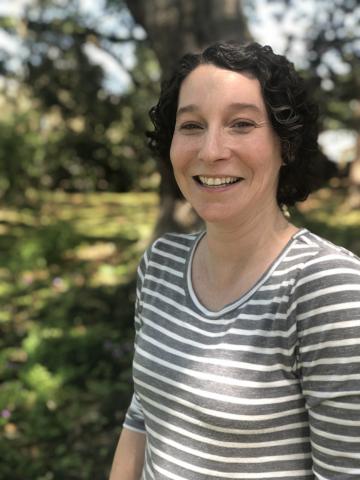During Fall 2024, the Office of Distance Learning celebrated its 50th Quality Matters course certification.
Distance Learning Gains Instructional Designer
Mon, 06/10/2019 - 3:40pmAfter 16 years as a University of Louisiana at Lafayette chemistry instructor, Andrea Leonard has joined the Office of Distance Learning as an Instructional Designer, building, she says, on the knowledge and experience she’s gained during nearly a decade of online instruction.
“I was at the first meeting when the Office of Distance learning asked, ‘Who wants to teach online?’” She says. “Since that time, I’ve become well versed in the theory and practice of course design for online and hybrid students, and I wanted to spend more time doing it.”
“I’ve learned a lot of new and exciting techniques, and hopefully I can bring that knowledge to others.”
Leonard has designed several online and hybrid chemistry courses since the University began expanding its offerings.
As the Office of Distance Learning 2017-2018 ULearn Faculty Fellow, Leonard conducted a major course redesign in order to explore adaptive learning practices and technology. The result was an adaptive General Chemistry I course built on the Realizeit platform. The course has since been recognized by Realizeit as best-in-class and is currently being marketed to other universities.
“Adaptive technology fosters personalized learning,” Leonard says. “Not everyone will receive the same experience, but everyone will achieve the same learning objectives. It helps learners focus where they need the most help and it won’t overwhelm learners with constant new information if they haven’t yet mastered previous skills.”
In her new role, Leonard says she wants to help faculty members get the most out of the courses they’re creating while expanding the use of adaptive learning methods.
“When you’re hired to instruct a class at the University level, you’re hired as a subject matter expert — you’re hired because of your knowledge of your field of study,” Leonard says. “You’re not hired because of your knowledge of course design. The job of the instructional designer is to help subject matter experts create quality educational experiences for their students using techniques and technologies that might not be familiar to them.”
She says she also wants to help faculty find solutions as they approach online and hybrid teaching for the first time, whether they want to ensure academy honesty, effectively present complex information, or foster interaction between students outside of the traditional classroom setting.
“Activity on the instructor’s part in email and on discussion forums can really overcome the hurdle of not being in the same room,” she says. “We have technology where we can speak with each other, where we can share screens with each other, we can look at a piece of notebook paper and write down things and share this with each other — and this can happen across the country.
“The technology exists for these uses and more, but most instructors aren’t aware of it because they’ve never had to use it, or it wasn’t used during their undergraduate experience. I want to make sure that everyone that wants to use such technology in their classes will have the understanding and help to use it.”
Request a consultation to work with an instructional designer on creating engaging assignments, integrating EduTools, aligning learning objectives and outcomes, improving course navigation and layout, humanizing, and more. We're available throughout the year.
